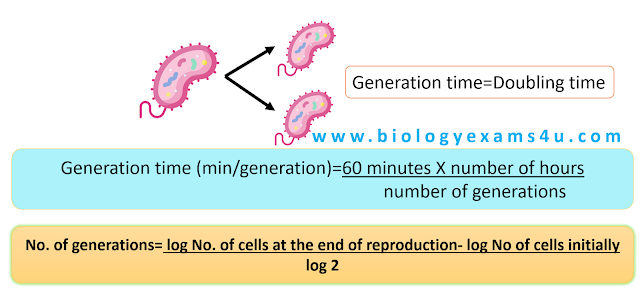What is Generation time in Microbiology?
Generation time is the
time required for a bacterial cell to grow and divide or the time required for
a population of cells to double in number.
The generation time of
E.coli in glucose salts is 17 minutes. That means if initial number is
10, to become 20, 17 minutes is required.
Let us work out a
problem.
?
if 100 bacteria multiply to produce a population of 3.28 × 106 cells
in 7 hours, then What is the generation time of this bacterium?
Generation
time (min/generation) = 60 minutes X number of hours
number
of generations
Step
1: Find out the number of
No.
of generations= log No. of cells at the end of reproduction- log No of cells
initially
log 2
Log
2 is used in the formula as each bacterial cell produces 2 offspring on each
division.
Step
2: Substitute the
Final
No. of cells at the end of reproduction=3.28 × 106 cells
Initial
No. of cells =100
No.
of generations=log (3.28 x 106) - log (100)/ log2
=6.515-2/0.30102
=4.515/0.30102
=14.99
=15 generations
Now
we know the number of generations.
Step
3 Find out generation time by substituting the
No.
of hours: 7 hours (given in the question)
No.
of generations: 15 hours (from the previous step)
Generation
time (min/generation) = 60 minutes X number of hours
number
of generations
Generation
time (min/gen) = 60 minx7hrs =28 min/generation
15
Thank you

